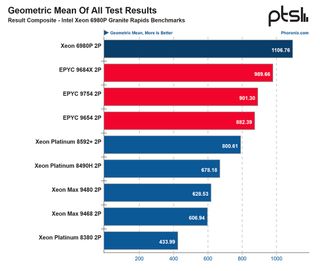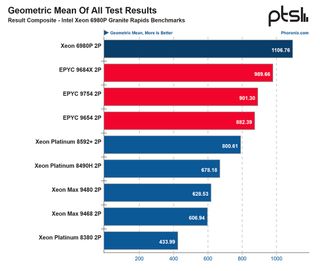Intel’s new 128-core Granite Rapids Xeon 6900P processor family is designed to compete directly with AMD’s EPYC offerings and comes in five variations.
There’s the 6960P (72 cores), 6952P (96 cores), 6972P (96 cores), and 6979P (120 cores), and the flagship 6980P with 128 cores and 256 threads, with a 2.0 GHz clock speed and 504MB of L3 cache.
The first reviews are in from some of the big tech sites, and they make for interesting reading, with the main consensus being that the 6900P family successfully heralds Intel’s long-awaited resurgence in the server CPU arena.
Could boost Intel’s data center presence
ServeTheHome hails Intel’s return to form after trailing AMD EPYC for years, stating, “Welcome back Intel!” The site was provided with a pre-production 6980P model by Intel, with some aspects, such as power metrics, pending further validation. Overall, STH‘s Patrick Kennedy was impressed, stating “from a raw performance perspective the Intel Xeon 6900P with 128 cores is stellar and takes the performance crown for now. Of course, AMD said Turin is coming in 2H 2024, so we are not far from AMD’s modern offering. In any event, Intel will be competing with the same core count, and a more comparable process technology, instead of at a 50% or more core count deficit and much older process technology that it has found itself at for half a decade.”
The Next Platform emphasized Intel’s strategic advancements, noting, as did STH, that the Xeon 6900P’s launch precedes AMD’s anticipated Turin processor. The site recognized Intel’s new chip’s potential to slow the company’s “CPU market share losses in the data center, even if it doesn’t reverse the trends.” The article also highlighted Intel’s new focus on power-constrained performance versus sheer IPC gains, showcasing a fresh approach in chip design.
On the performance side, Phoronix provided insights from Linux benchmarks, highlighting strong gains, particularly for the flagship 128-core Xeon 6980P, which pairs well with MRDIMM 8800MT/s memory. The site found that the Granite Rapids series exceeded expectations in various HPC and AI workloads, often outperforming AMD’s top EPYC Genoa and Bergamo models when the software was optimized for Intel’s AMX technology.
Despite some logistical challenges with the testing platform, Phoronix noted that with the Xeon 6900P series launch “Intel has shown they can return to competing with AMD EPYC at the top-end of HPC performance and other compute intensive workloads.”

The Arm question
Finally, Tom’s Hardware said “Intel’s Xeon 6 lineup finally brings it toe-to-toe with AMD’s traditional advantage in core counts, but the true story will be told in independent benchmarking and cost analysis of the differing platforms.” Writer Paul Alcorn also noted we don’t know how the range will fare up against competing Arm server chips. “Arm has steadily clawed its way into the data center, largely through custom models deployed by hyperscalers and cloud providers. That does make direct comparisons a bit tough, but we hope to see some virtualization comparisons against the Arm competition in the future.”
Despite the accolades for its raw performance, Intel’s new Xeon 6900P CPUs won’t come cheap. High production costs translate into a premium price, making it a costly upgrade for data center operators looking to enhance their infrastructure. Although pricing for the flagship 6980P hasn’t been announced yet, TheNextPlatform suggests it will come in at around $24,980.
More from TechRadar Pro
Services Marketplace – Listings, Bookings & Reviews
